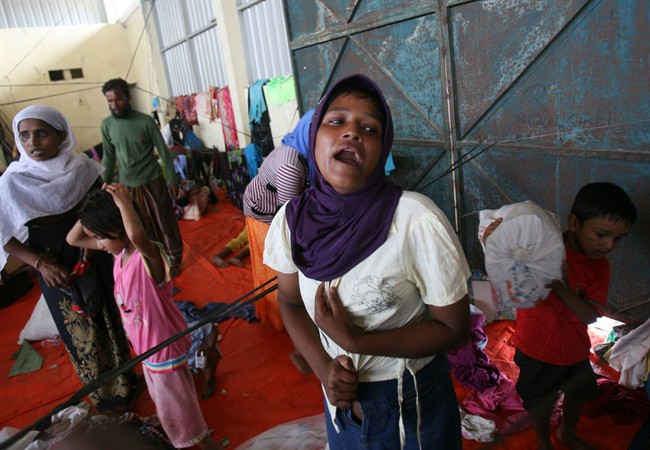YANGON, Myanmar – Myanmar refused to shoulder the blame for an escalating humanitarian crisis on Saturday, and cast doubts on whether it will attend a meeting to be hosted by Thailand later this month aimed at easing an emergency that has left boatloads of refugees stranded at sea.

“We are not ignoring the migrant problem, but our leaders will decide whether to attend the meeting based on what is going to be discussed,” said Maj. Zaw Htay, director of the office of Myanmar’s president. “We will not accept the allegations by some that Myanmar is the source of the problem.”
READ MORE: More than 1,000 migrants land in Indonesia and Thailand
Boats filled with more than 2,000 desperate and hungry refugees have arrived in Thailand, Malaysia and Indonesia in recent weeks, and thousands more migrants are believed to be adrift at sea after a crackdown on human traffickers prompted captains and smugglers to abandon their boats.
Many of those on the overcrowded vessels are ethnic Rohingya Muslims fleeing persecution in Myanmar. Others are Bangladeshis fleeing poverty.
Both groups seem intent on reaching Malaysia, a Muslim-majority country that has hosted more than 45,000 Rohingya over the years but now says it can’t accept any more. Indonesia and Thailand have voiced similar stances.
READ MORE: Malaysia turns away 2 boats carrying more than 800 Rohingya, Bangladeshi migrants
All three countries have their navies stationed in boats at maritime borders to push boats away or execute a so-called “help-on” policy of giving the boats food and water – and pointing them to other countries.
Myanmar appeared to direct some of the blame for the current crisis on its neighbours.
“From a humanitarian point of view, it’s sad that these people are being pushed out to sea by some countries,” said Zaw Htay, who heads the office of Myanmar President Thein Sein, who has not spoken publicly about the crisis since it escalated May 1.
Thailand has organized its May 29 regional meeting with officials from 15 countries to discuss the “root causes” of “irregular migration in the Indian Ocean.”
On Friday, Zaw Htay said that Myanmar’s government “will not attend a regional meeting hosted by Thailand if ‘Rohingya’ is mentioned on the invitation.” He accused governments of trying to divert their human smuggling and slavery problems by dumping the blame on Myanmar.
On Saturday, he said the official invitation still had not arrived.
An increasingly alarmed United Nations warned Friday against “floating coffins” and urged regional leaders to put human lives first. The United States urged governments not to push back new boat arrivals.
“The gravest violation of human rights are committed by those corrupt officials who are involved in human trafficking activities and colluded with the trafficking syndicates,” Zaw Htay said.
Thai authorities, long accused of turning a blind eye to human trafficking in exchange for pay, launched a crackdown May 1 after finding dozens of bodies buried at traffickers’ jungle camps on Thailand’s border with Malaysia. Dozens of Thai officials were arrested and more than 50 police are under investigation for complicity.
The UN calls the Rohingya one of the world’s most persecuted minorities. For decades, the Rohingya suffered from state-sanctioned discrimination in Buddhist-majority Myanmar. Denied citizenship by national law, they are effectively stateless.
In the last three years, attacks on Rohingya have left hundreds dead and sparked an exodus of an estimated 120,000 people who have boarded human traffickers’ boats to flee to other countries. The flight helped fuel a longstanding human smuggling industry in the region.
Even the name Rohingya is taboo in Myanmar, which calls them “Bengalis” and insists they are illegal immigrants from Bangladesh, even though Rohingya have lived in the predominantly Buddhist Southeast Asian country for generations.
—
Associated Press writer Jocelyn Gecker in Bangkok contributed to this report.



Comments